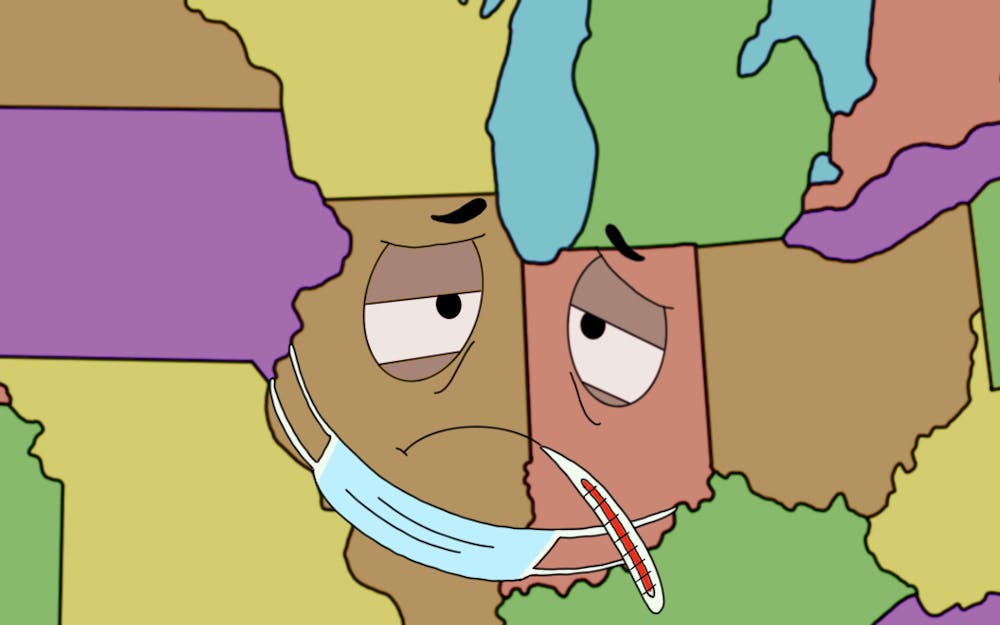In the past few years, it seems like heat waves cook cities, floods cut through mountains and hurricanes flatten towns more and more frequently.
Scientists have identified a common denominator in all of these disasters: climate change. But as we see the edges of our country battling the worst of it, the Midwest remains seemingly untouched and dangerously unbothered.
With the increasing prominence of dangerous, climate related disasters, it’s irresponsible to think the Midwest might go without seeing its effects. We have to invest in action to combat climate change.
Environment issues: Indiana is leading the way to environmental Armageddon
The White House released a list of projected environmental impacts to the Midwest as warming patterns continue. In Indiana, these effects include crop yields fluctuating and possibly declining due to changes in annual average temperatures and precipitation. Disruption of forest ecosystems stunting natural carbon absorption is also possible, as well as increased drought or flooding due to unusual decreases or extreme increases in rainfall totals.
We’ve already seen some of these environmental impacts, said Deidra Miniard. Miniard is a doctoral student studying environmental science, specifically how people perceive climate change.
Still, climate change seems like a far-off problem to many Midwesterners.
“Sometimes it can be hard to observe how climate change impacts your daily life,” Miniard said. “There have been studies that show that when people perceive something climate-related happening to them, they tend to care more about it as an issue.”
She also said these approaching disasters may not be directly related to the primary impacts of climate change, but they could manifest over time.
“Climate change is one of those things that exacerbates other issues,” Miniard said. “Name an issue in the U.S. and climate change will likely make it worse.”
Not only will we see the events listed above, but large-scale influences on the global economy and an increase in disease spread due to the expansion of habitable areas by mosquitoes and other bugs. We are also likely to see rising home insurance premiums and deductibles as climate disasters become more common and waning of consistent access to affordable, diverse foods at the supermarket.
Dr. James Farmer, an associate professor at the Paul H. O’Neill School of Public and Environmental Affairs, said though the ship has sailed on stopping the rise of temperatures, there is much we can do to adapt to the results of climate change as we slowly work to slow the planet’s heating.
“From the individual to the intergovernmental bodies, this is an all hands on deck situation,” Farmer said. “We all need to be working towards solutions, changing our behaviors and advocating for policy makers to act now and start implementing change.”
This is where we, the people, come in. Miniard said some of the most immediate work we can do is to analyze our own lives and decide how we might be able to minimize our carbon footprint and vulnerability to climate disasters. This includes anything from purchasing energy efficient appliances to finding greener ways to commute or travel. Small efforts by a large group of people can have big impacts.
However, to fully combat climate change, we must not only take personal action, but also cast ballots for candidates who support fundamental energy reform, regulation of corporate pollution and overall environmental protection on a legislative level.
While the future may look grim, there is still a glimmer of optimism from some experts.
“There is hope we can solve this problem,” Miniard said. “It’s important to reassure people that they don’t have to completely uproot their entire lives to be a good steward for the planet.”
We must take what action we can — from local to federal levels — to prevent the globe from further warming and prepare our world for the dangers we already face due to climate change.
Chris Sciortino (he/him) is a junior studying theater and public relations. He is involved with the Queer Student Union and College Democrats at IU and spends a considerable amount of time showing people pictures of his dog, Ellie.






